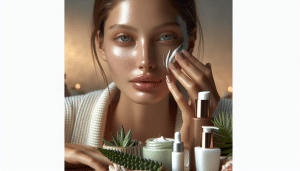Secrets You Might Want to Know About Collagen for Skin
Natalie Brooks September 5, 2025
Curious about how collagen supports radiant, youthful-looking skin? Dive into this in-depth guide exploring the science of collagen, its benefits for skin health, and natural ways to encourage production. Uncover what influences collagen, what to expect, and smarter strategies for achieving your glow goals.
Exploring Collagen’s Role in Healthy, Glowing Skin
Collagen is fundamental to skin resilience and elasticity. Naturally produced by the body, this vital protein provides the structural framework that keeps skin firm and smooth. As people age, collagen synthesis begins to decline, leading to visible changes such as fine lines, sagging, and a reduction in that luminous glow many seek. This is why collagen becomes so central to discussions of skin wellness. The conversation often turns to maintaining or boosting collagen levels, as it is directly tied to a more youthful appearance. A person’s intrinsic collagen levels can be influenced by a range of elements, including genetics, environmental factors, and lifestyle choices.
Studies indicate that collagen not only affects the skin’s strength but also plays an important role in hydration and the way the skin retains moisture. This connection is key: hydrated skin appears plumper and more radiant, while dryness highlights imperfections and can make wrinkles appear deeper. When examining routines that focus on minimizing signs of aging, collagen maintenance emerges as an essential theme. While skincare products frequently tout collagen-boosting ingredients, it’s important to understand what can realistically impact skin texture and appearance. Addressing collagen holistically offers a more comprehensive strategy than isolated topical applications alone.
Environmental exposures—sunlight, pollution, and even stress—can accelerate the breakdown of collagen fibers. Embracing protective measures such as sunscreen, antioxidants, and lifestyle modifications can help maintain collagen’s integrity over time. Recent research underscores the significance of proactive routines rather than reactive solutions. For many, the journey toward healthier skin involves exploring several approaches, from nutritional support and advanced skincare to emerging insights on gene involvement in collagen regulation. Each factor opens the door to informed decision-making on how to nurture naturally vibrant skin.
The Science of Collagen Synthesis and Loss
Collagen production occurs in the dermis, the skin’s second layer, where specialized cells called fibroblasts generate collagen fibers. These fibers are then woven together in a complex network, imparting tensile strength and flexibility. Naturally, the body’s collagen output is highest in youth, which is when skin tends to look its most resilient. However, after about the mid-twenties, synthesis rates start to slow down. The gradual reduction is subtle at first but becomes more apparent with advancing age, particularly when combined with external damage.
Key factors that drive collagen degradation include prolonged UV exposure, environmental toxins, and high levels of chronic stress. Ultraviolet light, in particular, initiates the formation of free radicals, which can disrupt the collagen matrix, making the skin more susceptible to wrinkles and laxity. Understanding these mechanisms sheds light on why sun protection remains an important tactic in promoting youthful-looking skin. Additionally, habits like smoking can accelerate this process by introducing harmful chemicals that impede collagen production, underscoring the need for a mindful approach to daily routines.
Emerging science is also uncovering the impact of nutrition and internal processes on collagen integrity. Deficiencies in nutrients such as vitamin C, copper, and amino acids may make it harder for the body to form strong collagen fibers. An increasing number of studies are highlighting the role of oxidative stress and glycation—a process where sugar molecules bind to collagen, reducing its elasticity. This means that the foods chosen, the way stress is managed, and environmental exposures collectively sculpt the skin over time. Supporting the body’s innate collagen-forming ability involves thoughtful choices that layer up for more resilient skin.
Nutritional Support for Collagen Production
Supporting collagen synthesis starts in the kitchen. Protein-rich foods supply amino acids—the essential building blocks for collagen creation. Choices like chicken, fish, eggs, and legumes fuel the body’s ability to regenerate. Vitamin C is equally crucial, serving as a required cofactor that enables enzymes to assemble stable collagen fibers. Fruits such as oranges, strawberries, and kiwis offer both antioxidants and ample vitamin C, providing double-duty benefits. Other micronutrients, like zinc and copper, also participate in the creation and cross-linking of collagen structures.
Some individuals explore the use of hydrolyzed collagen supplements, which are made from animal or marine sources. These deliver peptides that are thought to be bioavailable, meaning the body might absorb them easily and use them for rebuilding skin, tendons, or joints. Current studies suggest that supplementation could support skin elasticity and moisture content, though the magnitude of effect may vary from person to person. While not everyone may benefit from supplements, they are sometimes incorporated as one part of a wider routine that also emphasizes whole foods and nutrient diversity.
Eating patterns characterized by low sugar and high antioxidant intake appear favorable for collagen preservation. Excess sugar can bind to and degrade collagen (a process known as glycation), while antioxidants from colorful fruits and vegetables help counteract free radical activity. Hydration is another valuable piece of the equation: adequate water intake supports skin plumpness and enables metabolic processes that drive regeneration. Over time, the combination of these nutritional strategies may lead to noticeable changes in skin vibrancy, firmness, and texture— all essential for that sought-after glow.
Topical Strategies for Collagen Maintenance
Many topical skincare products claim to boost collagen. While not all deliver the same benefits, some ingredients are particularly well supported by research. Retinoids, derivatives of vitamin A, have been shown to stimulate collagen synthesis in the dermis. Regular use of retinoids encourages rapid skin renewal and can soften the look of fine lines. Another popular ingredient, vitamin C, acts both as an antioxidant and as a cofactor for collagen production, making it a favorite in serums and creams aimed at brightening and firming the skin.
Peptides have also garnered attention for their potential to signal collagen production. These short chains of amino acids mimic the building blocks of collagen and may prompt the skin to generate new fibers. When delivered via well-formulated creams, peptides could help reinforce firmness and texture. However, the bioavailability and effectiveness often depend on the quality and composition of the topical. Sunscreen deserves special mention, too: protecting against UV-induced collagen breakdown is foundational for any anti-aging routine. Applying broad-spectrum SPF regularly is one of the simplest ways to maintain elasticity over the years.
Some users also experiment with advanced treatments such as microneedling or laser therapy under professional guidance. These methods create controlled micro-injuries to promote a healing response, which can stimulate new collagen production. While not suitable for everyone and requiring expert oversight, such interventions represent a proactive route for those seeking visible changes. Combining professional treatments with daily topical strategies can offer a comprehensive regimen, provided safety and consistency remain top priorities.
Lifestyle Habits That Protect Collagen for Lasting Beauty
Lifestyle choices have a powerful impact on skin quality and collagen longevity. One key habit is staying protected from prolonged sun exposure: sunscreen, hats, and shade help reduce the cumulative effects of ultraviolet radiation. Sleep also emerges as a surprising yet essential ally—adequate rest gives the body a chance to repair damaged collagen and restore overall skin vibrancy. Research suggests that those with regular, restorative sleep cycles tend to experience fewer visible signs of accelerated skin aging.
Stress management is another valuable element in any beauty regimen. High stress causes the body to release cortisol, which can break down both new and existing collagen. Mindfulness practices such as meditation, yoga, or breathing exercises may help reduce overall stress levels and create a favorable environment for skin renewal. Smoking cessation is also advocated, as the toxins in cigarette smoke impair the formation and maintenance of high-quality collagen. Each lifestyle adjustment builds on the others, resulting in stronger, more resilient skin over time.
Regular physical activity rounds out the list of collagen-supporting behaviors. Exercise promotes healthy circulation, nourishes the skin, and can reduce inflammation, which collectively support regeneration processes at the cellular level. Drinking water, eating a variety of nutrient-dense foods, and remaining consistent with sun protection form the backbone of most successful skin wellness plans. Viewed as a holistic puzzle, these habits add up to a vibrant complexion and increased confidence in your skin’s natural beauty.
What to Expect When Supporting Collagen Naturally
Expectations around collagen can vary widely depending on starting point, age, and routine. Some individuals notice gradual yet visible improvement in firmness and radiance as they adopt healthy practices over time. Improvements are often most pronounced, research shows, when combining multiple strategies rather than relying on a single intervention. This might look like blending nutrition, sun defense, and the right skincare products consistently for several months or more.
It’s important to recognize that while dietary improvements and skincare routines offer support for collagen, natural biological processes remain influential. Genetics play a substantial role in how skin ages, including collagen production rates and how the skin responds to environmental stressors. Tracking progress using photos or skin hydration measurements can help provide a sense of what works—celebrating small wins makes the process rewarding. Partnering with a dermatologist or cosmetic professional can further individualize guidance, especially for those with particular concerns or skin conditions.
Ultimately, embracing patience and consistency is key. Even the most rigorous routines require time for visible results to appear, as skin renewal cycles span several weeks. The journey toward maintaining and rejuvenating collagen-rich skin is as much about self-care as it is about science. Approaching it with curiosity and adaptability allows for a more enjoyable, lasting commitment to wellness and beauty. That glowing complexion? It’s an ongoing process, shaped by informed, mindful choices every day.
References
1. Feldman, J.L. & Kligman, A.M. (2020). The importance of collagen in skin health. Retrieved from https://www.ncbi.nlm.nih.gov/pmc/articles/PMC8609686/
2. Harvard Health Publishing. (2021). The science of skin. Retrieved from https://www.health.harvard.edu/staying-healthy/the-science-of-skin
3. Cleveland Clinic. (n.d.). Collagen: benefits, risks, and more. Retrieved from https://my.clevelandclinic.org/health/articles/22784-collagen
4. Linus Pauling Institute. (n.d.). Micronutrient Information Center: Vitamin C and skin health. Retrieved from https://lpi.oregonstate.edu/mic/health-disease/skin-health/vitamin-c
5. American Academy of Dermatology. (2021). Retinoids and the skin. Retrieved from https://www.aad.org/public/diseases/a-z/retinoids-overview
6. Johns Hopkins Medicine. (n.d.). The truth about topical vitamin C. Retrieved from https://www.hopkinsmedicine.org/health/wellness-and-prevention/the-truth-about-topical-vitamin-c








